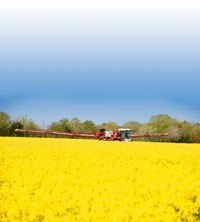Yield fears boost rape markets to two-year high

Oilseed rape prices have hit new highs over the past week as markets reacted to yield concerns in key production areas.
Traders have suggested the EU-27 could struggle to produce a total crop of 20m tonnes this harvest, 1.5m tonnes below last year.
Early reports suggested French yields could be 13-15% below expectations, resulting in a crop 1m tonnes smaller than last year at 4.5m tonnes, while the German crop has been downgraded by 600,000t to 5.6m tonnes. There were also concerns for weather-affected crops in Ukraine and Canada.
The yield worries fuelled big gains in futures markets, with the Paris Matif hitting a two-year high of €370/t late last week, equivalent to more than £280/t ex-farm.
Prices had fallen back to about €361/t or £270-275/t ex-farm, as Farmers Weekly went to press on Wednesday (21 July), but the overall sentiment among traders remained bullish, at least for the short term. November futures prices carried a £10/t premium at about £280-285/t at the time of writing.
“The Matif has been volatile and difficult to read recently,” said United Oilseeds trading manager Owen Cligg. “In the UK, we haven’t seen the volatility that French and Canadian markets have seen, largely because of the pound:euro exchange rate softening the extremes. Prices have come back a bit since last week’s spike, but there might still be some upside in the market.”
Initial reports from the UK harvest suggested crops had not fared too badly in the dry weather earlier this year, he said. “Overall yields are likely to be down on last year’s higher-than-average crop, but it’s still early days. We’ve seen anything from 2.5-5.5t/ha so far, and we estimate a UK crop of just over 2m tonnes.”
Openfield’s head of oilseed rape John Thorpe said markets would remain volatile as harvest progressed, but he was reasonably upbeat about price prospects. “Crops in France, Germany, Canada and Ukraine may be down, but the demand is still there and we’ve seen a lot of export interest. At one point, August movement was trading at a premium to November as people looked to secure supply.”
Chinese demand for oilseed was a big driver, alongside the increased biofuel mandates being introduced in Europe and elsewhere. Argentina was scheduled to raise its biofuel mandate from 7% to 10% from January, which would take more crop off the market, he said. “There could be some harvest pressure [on prices] if we find all crops coming in at once. But, generally, I’m reasonably optimistic.”
Mr Cligg acknowledged there was some danger that oilseed rape could price itself out of the market if prices climbed too high and crushers were forced to use alternatives, such as soya oil. “For edible oils it’s easier to swap oilseed rape oil, but rape oil is the preferred substrate for the biodiesel market, making demand fairly inelastic,” he said.
• code123
